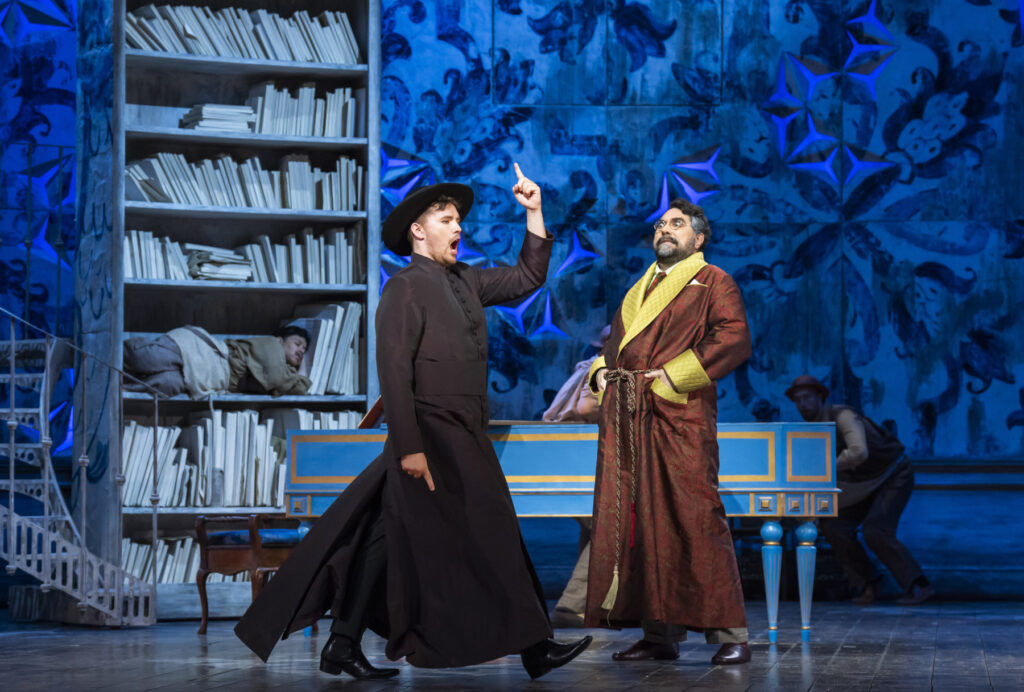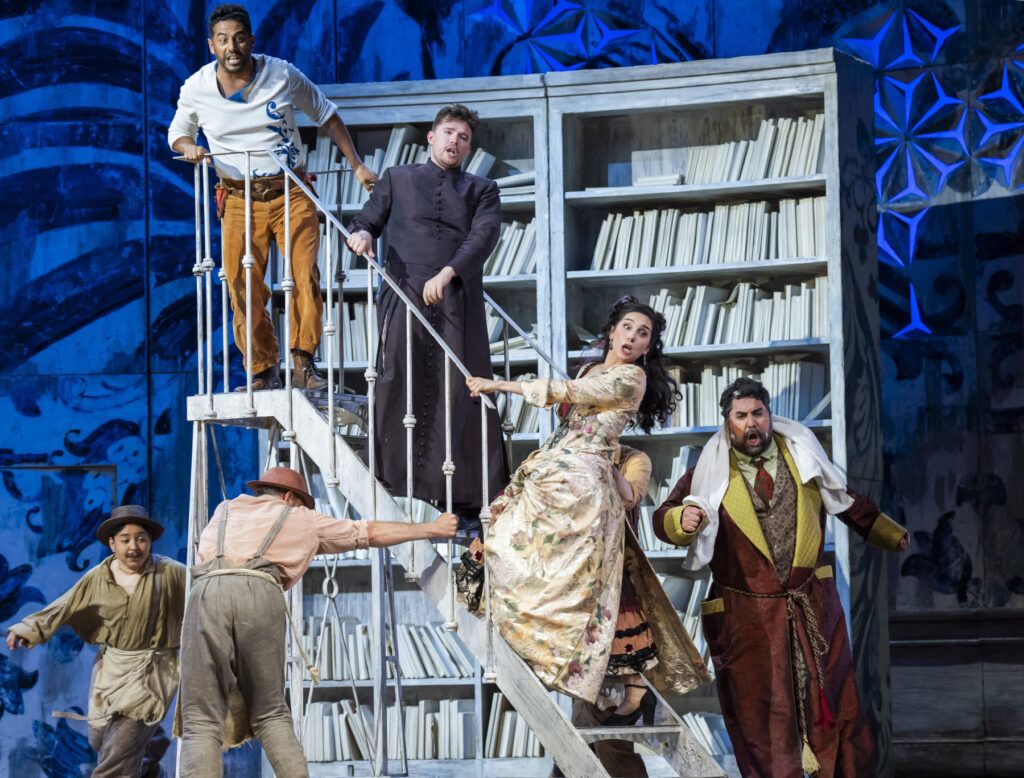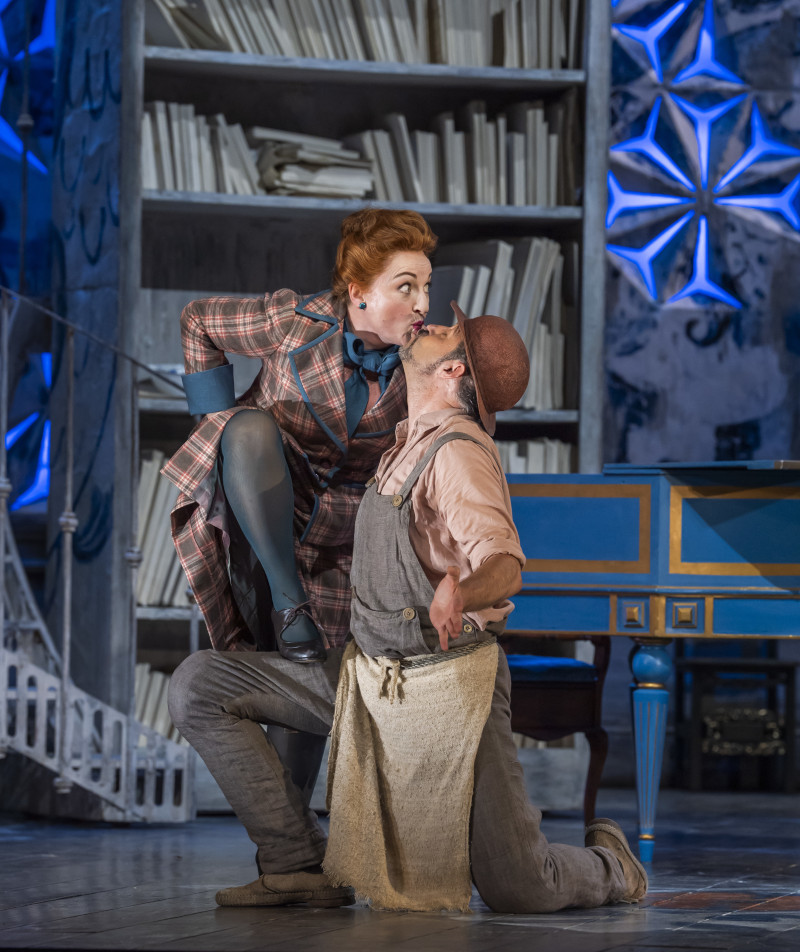This revival of Annabel Arden’s production of The Barber of Seville for Glyndebourne happily falls within the same season in which its sequel The Marriage of Figaro will also be shown, as occurred when this Barber was first given in 2016. It will be a new production of Mozart’s opera by Mariame Clément this year, however, so it remains to be seen what correspondences may happen to arise between the two. Where Michael Grandage’s production of Figaro recreated the setting of a palace in Seville with authentic realism, Arden’s vision for the Barber is suggestive for the elements of Seville’s cityscape and atmosphere it throws together in a colourful madcap medley, underlining the work’s bubbling comedy and sense of almost improbable fantasy. Daringly, despite the profusion of the designs, it makes do with a fairly minimal set in terms of furnishings and objects on stage, and so it becomes a tour de force for the singers themselves to maintain the drama’s energy and play up the gags with their own acting or choreography. Costumes are of no particular time or place but capture the spirit of each character, given their age or social position, without resorting to facile caricature.

A generally young and enthusiastic cast use their wits effectively to propel the comedy seamlessly, with Germán Olvera’s sprightly and resourceful Figaro leading the way, popping up first from within the orchestra pit at the start of ‘Largo al factotum’, which emphasises the meta-theatrical role which music plays within work itself. Further scripted jokes between Figaro and conductor Rory Macdonald across the stage run with that theme (though nobody in the audience seems to have got the reference to Paisiello, whose own operatic setting of Beaumarchais’s play came to be superseded by Rossini’s as the public’s favourite). Following the memorable description of Figaro’s ubiquity in that famous aria, he comes and goes among the subsequent action with impish mischief, just as Cherubino will do in the following comedy. But vocally Olvera sustains a robust, assured presence so that it is never in doubt that he is pulling the strings.

Jonah Hoskins offers a creditable performance as the young Count with a flourishing upper range that convincingly expresses his amorous ardour, even if that doesn’t quite carry through to the rest of his register. Cecilia Molinari’s burnished, smoky tone as Rosina suggests a more mature, or determined and knowing young woman, despite having been confined at home by her guardian, Dr Bartolo, for so long. In the latter role Fabio Capitanucci is less a comic buffoon and more conventionally plodding and hapless, with curiously little emphasis on the anti-climax after Basilio’s ‘Calumny’ aria when he refuses to go along with that scheme, for example. But there’s no question about his vocal agility in an especially speedy rendition of the second section of ‘A un dottor della mia sorte’ which is despatched without being garbled. Basilio receives a decent account from Alessio Cacciamani who plays the part straight rather than with any sinister slyness as he is usually depicted. As Bartolo’s housekeeper, Berta, Ailish Tynan serves as a fitting counterpart to Figaro, as a discreetly flitting presence on stage, coming into her own for her skittish aria (even if revealing her suspenders somewhat plays to the gallery, though it salvages the traces of lewd humour and behaviour on the part of such servant figures in earlier opera buffa).

Macdonald’s performance with the London Philharmonic Orchestra is attentive to the picaresque details of the score which vividly point up the opera’s moments of comedy and satire, for instance in the strings’ glissandos which accompany Figaro’s description of his inspiration as being like a live volcano. But the ensemble also maintain a well-paced, fluent course through its larger structures that coalesces well with the unfolding of the stage action.
Curtis Rogers
The Barber of Seville
Composer: Gioachino Rossini
Libretto: Cesare Sterbini
Cast and production staff:
Figaro – Germán Olvera; Count Almaviva – Jonah Hoskins; Rosina – Cecilia Molinari; Dr Bartolo – Fabio Capitanucci; Fiorello – Hector Bloggs; Berta – Ailish Tynan; Basilio – Alessio Cacciamani; Officer – Jonathan Eyres
Director – Annabel Arden; Designer – Joanna Parker; Movement Director – Toby Sedgwick; Revival Movement Director -Maxime Nourissat; Lighting Designer – James Farncombe; Revival Lighting Designer – Kevin Treacy; Conductor – Rory Macdonald; The Glyndebourne Chorus and London Philharmonic Orchestra
Glyndebourne Festival Opera, Lewes, East Sussex, England, Saturday 24 May 2025
Top image: Figaro (Germán Olvera) and Rosina (Cecilia Molinari)
All photos © Glyndebourne Productions Ltd. Photo: Tristram Kenton